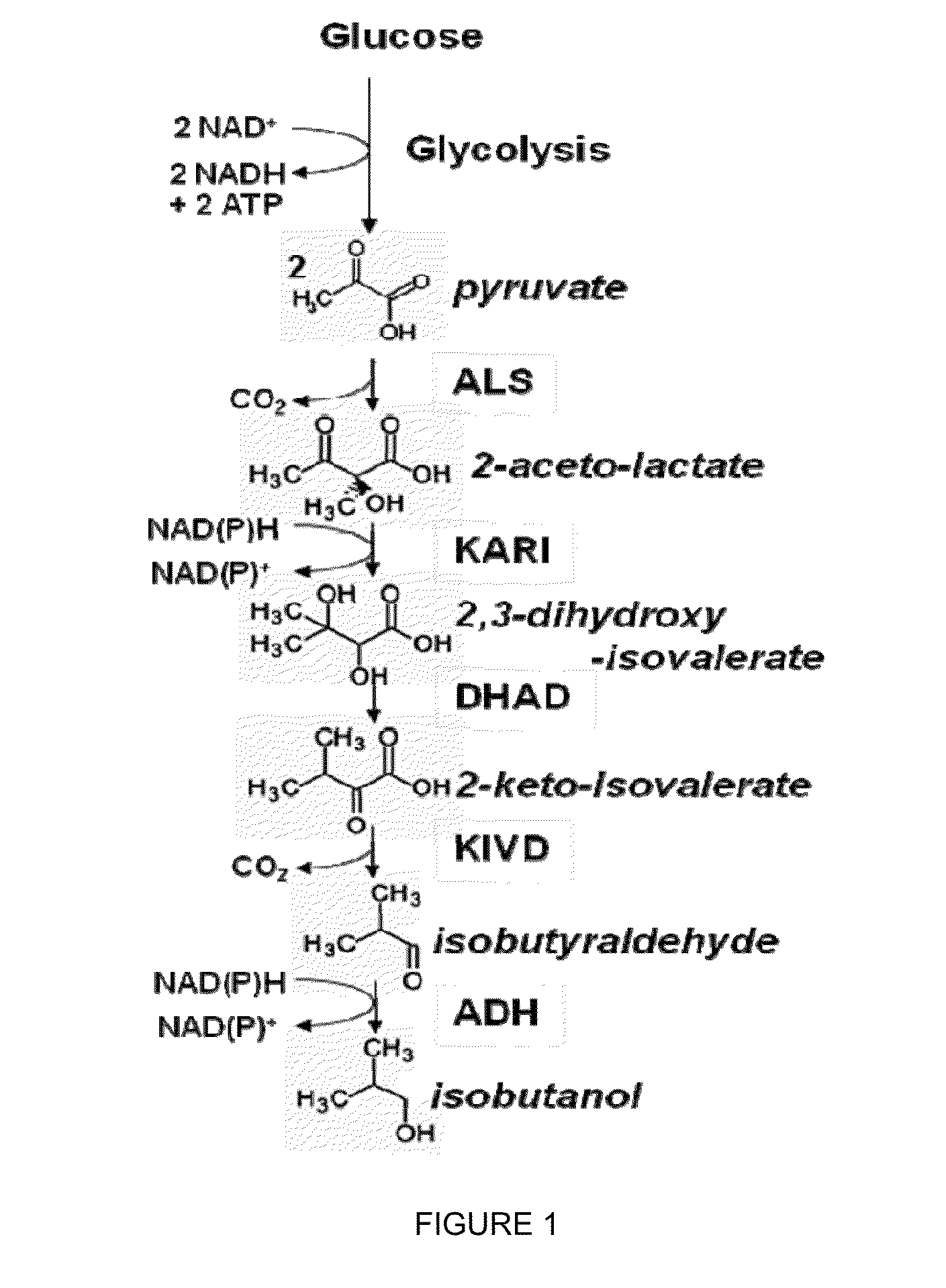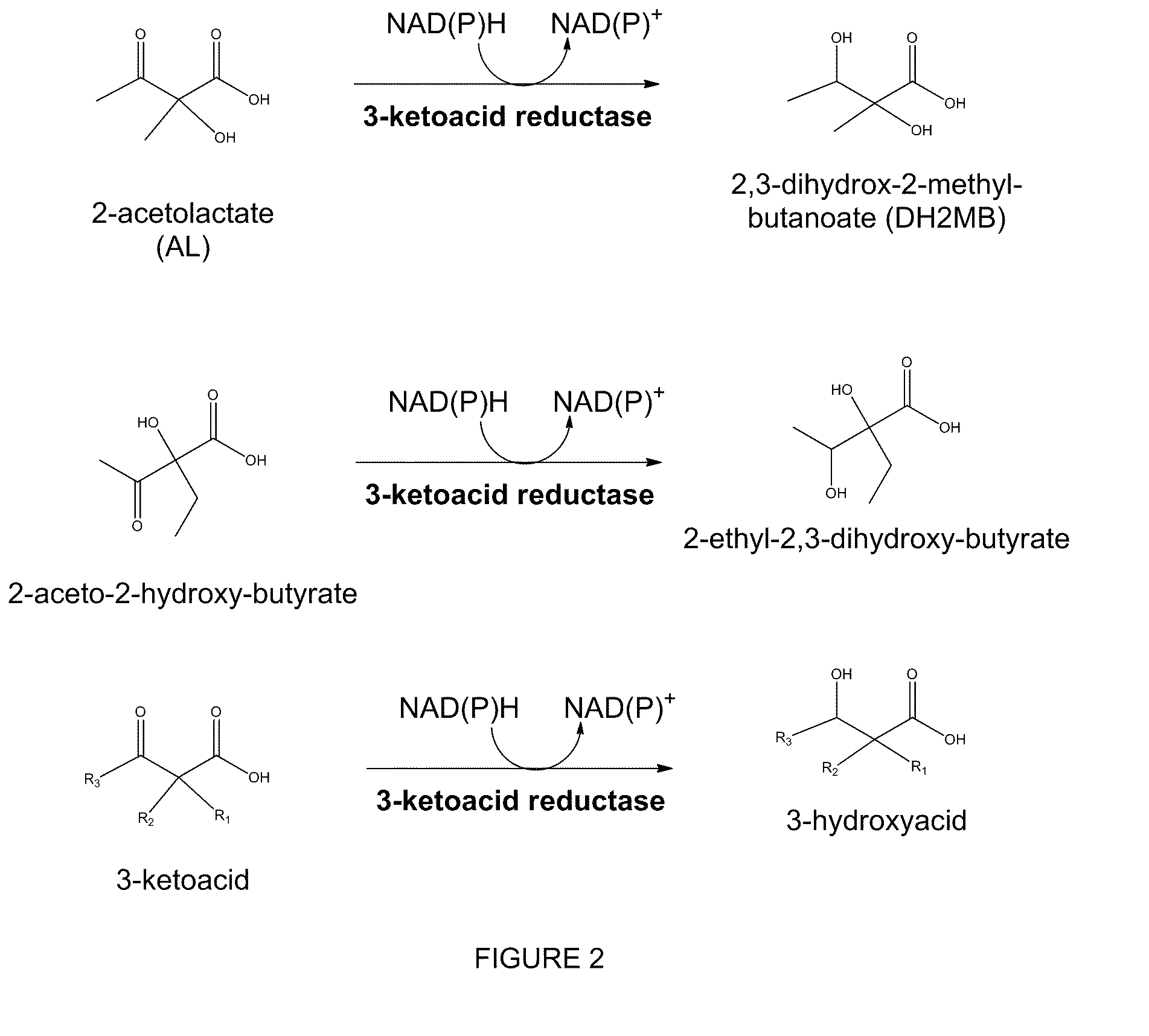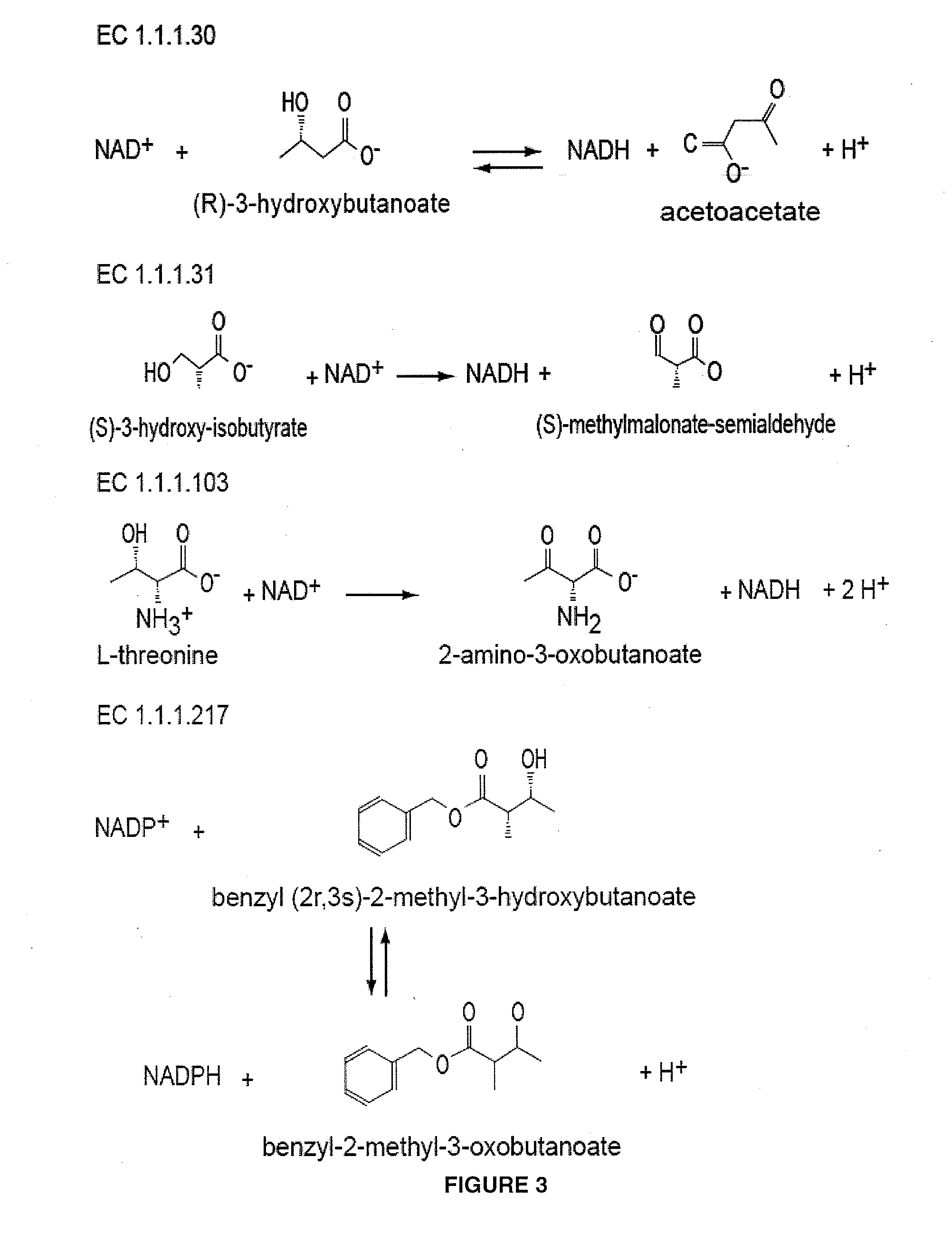Yeast microorganisms with reduced by-product accumulation for improved production of fuels, chemicals, and amino acids
a technology of by-product accumulation and yeast microorganisms, which is applied in the field of yeast microorganisms with reduced by-product accumulation for improving the production of fuels, chemicals, and amino acids, can solve the problems of reducing the optimal productivity and yield of 3-keto acid- and/or aldehyde-derived products, and achieves enhanced catalytic efficiency of modified adh enzyme, enhanced ability to convert isobutyraldehyde, and enhanced catalytic efficiency of modified adh
- Summary
- Abstract
- Description
- Claims
- Application Information
AI Technical Summary
Benefits of technology
Problems solved by technology
Method used
Image
Examples
example 1
Increased Isobutanol / Isobutyrate Ratio by Increasing ADH Activity in S. cerevisiae
[0366]The purpose of this example is to demonstrate that increased alcohol dehydrogenase activity results in an increased isobutanol yield, a decreased isobutyrate yield, and an increase in the ratio of isobutanol yield to isobutyrate yield.
[0367]Strains and plasmids disclosed in this example are shown in Tables 7 and 8, respectively.
TABLE 7Genotype of Strains Disclosed in Example 1.GEVO NumberGenotypeGEVO2843S. cerevisiae, MATa ura3 leu2 his3 trp1pdc1Δ::PCUP1:[Bs_alsS1_coSc:TCYC1: PPGK1:Ll_kivD2: PENO2: Sp_HIS5]pdc5Δ::[LEU2: bla: PTEF1: ILV3ΔN: PTDH3:EC_ilvC_coScQ110V]pdc6Δ::[URA3: bla: PTEF1: Ll_kivD2: PTDH3:Dm_ADH]{evolved for C2 supplement-independence, glucosetolerance and faster growth}
TABLE 8Plasmids Disclosed in Example 1.Plasmid NameRelevant Genes / UsageGenotypepGV20112μ plasmid expressingPTDH3:Ec_ilvC_coScQ110V,KARI, and DHADPTEF1:Ll_ilvD_coSc,2μ ori, bla, G418RpGV24852μ plasmid expressingPTD...
example 2
Further Increased Isobutanol / Isobutyrate Ratio by Use of Variant ADH Ll_AdhARE1 in S. cerevisiae
[0373]The purpose of this example is to demonstrate that expression of an alcohol dehydrogenase with increased kcat and decreased KM results in a further increase in isobutanol yield, decrease in isobutyrate yield, and increase in the ratio of isobutanol yield to isobutyrate yield.
TABLE 11Genotype of Strains Disclosed in Example 2.GEVONumberGenotypeGEVO2843S. cerevisiae, MATa ura3 leu2 his3 trp1pdc1Δ::PCUP1:[Bs_alsS1_coSc:TCYC1: PPGK1: Ll_kivD2:PENO2: Sp_HIS5]pdc5Δ::[LEU2: bla: PTEF1: ILV3ΔN: PTDH3:Ec_ilvC_coScQ110V]pdc6Δ::[URA3: bla: PTEF1: Ll_kivD2:PTDH3: Dm_ADH]{evolved for C2 supplement-independence, glucosetolerance and faster growth}
TABLE 12Plasmids Disclosed in Example 2.Plasmid NameRelevant Genes / UsageGenotypepGV25432μ plasmid expressingPTDH3:Ec_ilvC_coScQ110V,KARI, DHAD, KIVD,PTEF1:Ll_ilvD_coSc,and ADHPPGK1:Ll_kivD_coEc,(Ll_AdhAhis6)PENO2: Ll_AdhAhis6,2μ ori, bla, G418RpGV25452μ...
example 3
Further Increased Isobutanol / Isobutyrate Ratio in S. cerevisiae by Expression of RE1
[0378]The purpose of this example is to demonstrate that expression of an alcohol dehydrogenase with increased kcat and decreased KM results in an increase in isobutanol yield and a decrease in isobutyrate yield in fermentations performed in fermenter vessels.
[0379]A fermentation was performed to compare performance of S. cerevisiae strains GEVO3519 and GEVO3523. Isobutanol and isobutyrate titers and yields were measured during the fermentation. GEVO3519 carries a 2μ plasmid pGV2524 that contains genes encoding the following enzymes: KARI, DHAD, KIVD and his-tagged, codon-optimized wild-type Lactococcus lactis ADH. GEVO3523 carries a 2μ plasmid pGV2524 that contains genes encoding the following enzymes: KARI, DHAD, KIVD and an improved variant of the his-tagged, codon-optimized Lactococcus lactis ADH having decreased KM and increased kcat. These strains were evaluated for isobutanol, isobutyraldehyde...
PUM
 Login to View More
Login to View More Abstract
Description
Claims
Application Information
 Login to View More
Login to View More - R&D
- Intellectual Property
- Life Sciences
- Materials
- Tech Scout
- Unparalleled Data Quality
- Higher Quality Content
- 60% Fewer Hallucinations
Browse by: Latest US Patents, China's latest patents, Technical Efficacy Thesaurus, Application Domain, Technology Topic, Popular Technical Reports.
© 2025 PatSnap. All rights reserved.Legal|Privacy policy|Modern Slavery Act Transparency Statement|Sitemap|About US| Contact US: help@patsnap.com



